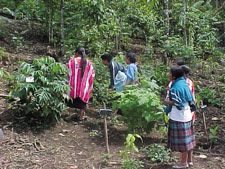URL: http://www.nature.com/cgi-taf/DynaPage.taf?file=/nature/journal/v408/n6810/full/408278a0_fs.html
Date accessed: 31 January 2001
Nature 408, 278 (2000) © Macmillan Publishers Ltd.
![]() 16
November 2000
16
November 2000
REX DALTON
[MEXICO CITY]
 |
|
Bounty hunters? Some groups claim that bioprospecting exploits indigenous people. |
Two US-funded teams — each involving scientists from US and Mexican universities — have stopped searching for specimens because they cannot secure the appropriate permits from the Mexican government. A third effort involving scientists at the National Autonomous University of Mexico (UNAM) and Diversa, a Californian biotech firm, was halted earlier in the year.
The slowdown comes as Mexico undergoes a historic change of government, with Vicente Fox ending 80 years of rule by the Institutional Revolutionary Party when he becomes president next month. At the same time, the Rural Advancement Foundation International (RAFI), an advocacy organization based in Canada, has mounted a public campaign alleging that bioprospectors are exploiting indigenous people.
The blocking of the projects has dismayed US and Mexican scientists alike. "It is very unfortunate," says Joshua Rosenthal of the Fogarty International Center at the US National Institutes of Health (NIH), which funds the two projects. "What is required now is some clarity from the new government in Mexico."
Fernando Tudela, chief of staff for the Mexican ministry for the environment, natural resources and fisheries, says: "We share the frustration of the scientists. But Mexico lacks a legal framework for bioprospecting. I would not advise undertaking one of these projects now."
Tudela, who loses his post when the new government takes over, adds: "My advice to the next administration is to carefully draft a plan for broad discussions of rules and guidelines for bioprospecting."
Brent Berlin, a University of Georgia ethnobiologist who has worked in southern Mexico for 30 years and whose project in Chiapas was recently blocked, says that "paralysis" has enveloped bioprospecting in Mexico. "The work is going to happen, but at a slower pace," says Berlin. His project involved interviewing Mayans in the highlands near Mexico's southern border, identifying the substances their healers use for therapies, and collecting plants for analysis. Identified active compounds then might be used for drugs or agricultural products.
Before the current impasse, Mexico had issued a handful of permits for scientific collections under the international Convention on Biological Diversity's guidelines for universities, biotechnology companies and indigenous people. One such permit allowed El Colegio de la Frontera Sur (ECOSUR) in Chiapas, working with Berlin, to collect about 5,600 plant specimens.
But RAFI and allies have branded the project "biopiracy", alleging inadequate Mayan participation. Berlin and ECOSUR scientists say that RAFI has maligned them unfairly. But when ECOSUR applied to Mexico's National Institute of Ecology for a permit to collect plant samples for bioassays for commercial products in September, after Fox's election, the institute made demands that the team found impossible to meet.
At the same time, US officials became concerned about another bioprospecting project, involving the University of Arizona and UNAM's Botanical Garden in Mexico City. Arizona had a contract with the pharmaceutical corporation American Home Products to develop any discoveries from the collaboration. But after problems arose with the Mayan project permit, the NIH's Rosenthal advised UNAM to halt the collections.
Category: 19. General Patent and Biotechnology Information